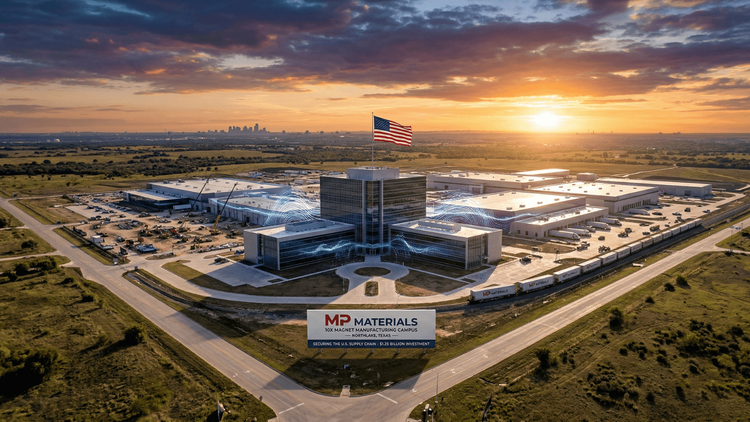Super Micro's Red Flags: A Wake-Up Call for Cautious Investors
Super Micro's Troubles Signal Caution for Investors Amid AI Infrastructure Boom

Super Micro Computer Inc. (SMCI) has been one of the hottest stocks on Wall Street, driven by the surge in artificial intelligence (AI) infrastructure spending. However, recent developments have cast a shadow over the company, prompting even the most daring dip buyers to think twice before jumping in. In this article, we delve into the red flags surrounding Super Micro, examining why these concerns are more than just a blip on the radar and what they mean for cautious investors.

The Rise and Fall of Super Micro Computer Inc.
Super Micro's rise to fame has been nothing short of spectacular. The company, which specializes in high-powered servers for data centers, has been a key player in the AI boom. As businesses and governments alike rushed to build the infrastructure needed to support AI, Super Micro's revenue growth soared. In 2023 alone, the stock skyrocketed nearly 250%, making it one of the best-performing stocks of the year.
In March 2024, Super Micro was added to the S&P 500 Index, a significant milestone that typically signals a company's solid standing in the market. However, this addition also marked the peak of the stock's performance. Since then, Super Micro shares have plummeted by 64%, with much of the decline occurring in the past month.
The turning point came when Hindenburg Research, a well-known short-seller, released a scathing report on Super Micro. The report alleged "glaring accounting red flags," undisclosed related-party transactions, and issues related to sanctions and export controls. These allegations have not only tarnished the company's reputation but also raised serious questions about its financial health.
The Accounting Red Flags
One of the most concerning developments is Super Micro's delayed 10-K filing. The company announced that it needed more time to assess its internal controls, a move that has only added to the uncertainty surrounding the stock. Investors and analysts alike are now questioning the reliability of the company's financial statements, and many are choosing to stay on the sidelines until more clarity emerges.
This isn't the first time Super Micro has faced scrutiny over its accounting practices. In 2020, the company was investigated by the U.S. Securities and Exchange Commission (SEC) for its accounting and disclosures between 2014 and 2017. Although Super Micro resolved the investigation by correcting its financial statements and paying a penalty, the current allegations have reignited concerns about the company's transparency.
The delayed filing and the historical issues have raised questions about the company's internal controls and governance. Even if the current allegations don't lead to significant findings, the reputational damage could have long-lasting effects on Super Micro's stock price and investor confidence.
The Market's Reaction
In the wake of the Hindenburg report and the delayed 10-K filing, Super Micro's stock has taken a beating. The stock is on track for its worst month in nearly six years, with a decline of 36% in just one week. The selloff has wiped out billions of dollars in market value, leaving many investors wondering whether the stock can recover.
Despite the sharp decline, some analysts argue that Super Micro's current valuation could be attractive under different circumstances. The stock is trading at less than 12 times estimated earnings, a significant discount to its 10-year average and a fraction of its recent peak. However, the ongoing uncertainty makes it difficult to assess the company's fundamentals accurately.
Several analysts have taken a more cautious stance on Super Micro following the recent developments. Bank of America, for example, moved its rating to "under review," citing the uncertainty surrounding the delayed filing and potential findings from the company's internal review. Similarly, CFRA downgraded the stock, noting that while the evidence presented by Hindenburg doesn't conclusively prove significant accounting malpractice, the delay and potential reputational damage are cause for concern.
The Broader Implications for AI Infrastructure
Super Micro's troubles have broader implications for the AI infrastructure market. The company's growth has been driven by the surge in demand for AI servers, but there are concerns about how long this trend can continue at its current pace. Some analysts worry that the market may be approaching saturation, leading to slower growth in the coming years.
Nvidia Corp., another major player in the AI space, recently provided a forecast that fell short of the most optimistic expectations. The company's stock dropped 6.4% following the announcement, signaling that even the biggest names in AI are not immune to market headwinds. This adds to the uncertainty surrounding Super Micro and raises questions about the sustainability of the AI infrastructure boom.
For investors looking to capitalize on the AI infrastructure trend without taking on the risks associated with Super Micro, there are other options. Dell Technologies Inc., for example, reported better-than-expected revenue growth driven by AI server sales. Unlike Super Micro, Dell doesn't have the same red flags, making it a potentially safer bet for cautious investors.
The Long Road to Recovery
Super Micro has a long road ahead if it wants to rebuild investor confidence. The company will need to address the concerns raised by Hindenburg Research and provide a clear explanation for the delayed 10-K filing. Transparency and strong governance will be crucial in regaining the trust of both investors and analysts.
While Super Micro's business remains strong, as evidenced by its revenue growth, the recent developments highlight the importance of strong fundamentals. Investors will be closely watching the company's next earnings report and any updates on the internal review to assess whether the stock is worth the risk.
For those considering buying the dip, Super Micro presents a high-risk, high-reward scenario. While the stock's current valuation may seem attractive, the ongoing uncertainty and potential for further declines make it a risky bet. Investors should carefully weigh the risks before making any decisions.
Conclusion
Super Micro Computer Inc. was once a darling of the AI infrastructure boom, but recent developments have turned it into a cautionary tale. The allegations of accounting issues, delayed 10-K filing, and subsequent stock decline have raised serious concerns about the company's future. While there is still potential for recovery, the risks are significant, and investors should proceed with caution. The AI infrastructure market may continue to grow, but Super Micro will need to overcome these challenges before it can regain its former glory.






